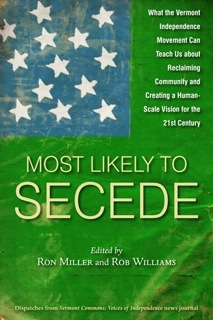Most Likely to Secede
What the Vermont Independence Movement Can Teach Us about Reclaiming Community and Creating a Human-Scale Vision for the 21st Century
March in Vermont means it’s time for starting tomato plants and attending Town Meeting. Self-sufficiency and local control: two things that life in Vermont is all about.
Appropriately enough, this March will also see the launch of a collection of thought-provoking essays that consider Vermont’s unique history and possible futures. In Most Likely to Secede, editors Ron Miller and Rob Williams have gathered insightful, sometimes radical, essays from experts in government, economics, and environmentalism who call on Vermont to lead the way in demonstrating their belief that small-scale governance works better for everyone.
The challenging essays here are drawn from articles published in The Vermont Commons: Voices of Independence, a bimonthly journal that arose out of dissatisfaction with the status quo in American politics in the aftermath of 9/11. Building on the work of Vermont resident Thomas Naylor, co-author of Downsizing the U.S.A. (1997), the journal published responses to the suggestion that Vermont could “separate from national politics altogether” and “lead the way toward the dissolution of the empire.”
The responses came from a wide range of knowledgeable writers, including recognizable names like climate change expert Bill McKibben and decentralist scholar Kirkpatrick Sale, as well as specialists like permaculturist Ben Falk and socially responsible business advocate Amy Kirschner. Editors Miller and Williams, frequent contributors on education and media topics themselves, have selected several dozen pieces from The Vermont Commons’s archive to highlight in Most Likely to Secede. The compilation is a treasure trove of radical thought, and well worth acquiring for the exceptional reading list alone.
Organized by topic, this compendium examines the big picture of American politics as well as the specific ways a small, rural state like Vermont might operate differently in independence. The volume moves from overarching pieces on “The Collapse of the American Empire” to specific solutions including regional economies, local food systems, and health care alternatives, offered by people who have spent years developing such programs. While it cannot be called even-handed—the articles are clearly written by folks with a particular point of view—the book is refreshingly grounded in evidence. Ben Falk, for instance, doesn’t just theorize about a supposedly beneficial change in agricultural practices; he shows readers how permaculture methods have been successfully applied.
The articles presented here were published recently, from 2005 to 2011, and the book includes updates from the editors in 2012. Not surprisingly, though, the discussion often circles back to Vermont’s unique history. The final section of the collection really addresses the question: why should Vermont consider secession? These pieces recall Vermont’s early days as an independent republic before joining the union in 1791. Formed as a sovereign state, the authors convincingly argue, Vermont never really gave up its independence, and so is uniquely suited to returning to those roots.
Whether readers agree with the authors’ arguments or not, they will get an informed look at the political origins of the fourteenth state, along with plenty of food for thought for the future. Most Likely to Secede gives tangible meaning to the popular admonition to “think globally and act locally.”
Reviewed by
Sheila M. Trask
Disclosure: This article is not an endorsement, but a review. The publisher of this book provided free copies of the book and paid a small fee to have their book reviewed by a professional reviewer. Foreword Reviews and Clarion Reviews make no guarantee that the publisher will receive a positive review. Foreword Magazine, Inc. is disclosing this in accordance with the Federal Trade Commission’s 16 CFR, Part 255.

